Research Proposal: Recycled Packaging in India and Economic Impact
VerifiedAdded on 2022/12/27
|7
|2369
|72
Report
AI Summary
This research proposal investigates the critical role of recycled packaging in India's economic and industrial landscape. It examines the detrimental effects of excessive plastic use on the Indian economy and emphasizes the need for a shift towards a circular economy through the adoption of reusable packaging. The study aims to determine the impact of recycled packaging on Indian industries, assess the need for reusable packaging to reduce plastic consumption, and identify how recyclable packaging can improve the country's economic position. The research will employ a quantitative methodology, utilizing surveys and secondary data analysis. The proposal reviews existing literature, identifies research gaps, and outlines the roles of industries, consumers, and the government in supporting the transition to a more sustainable model. The findings are expected to provide insights into the benefits of recycled packaging and its contribution to a circular economy in India.
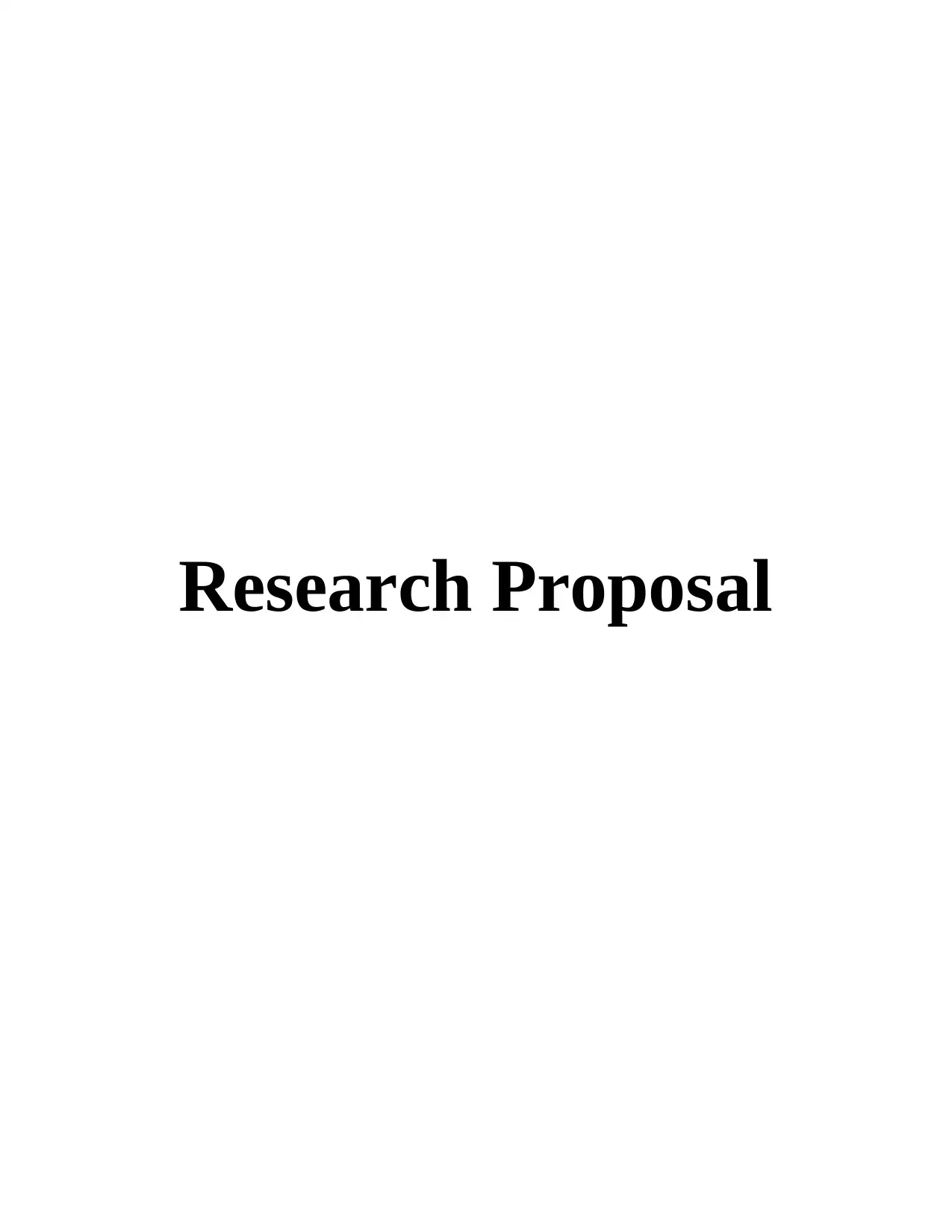
Research Proposal
Paraphrase This Document
Need a fresh take? Get an instant paraphrase of this document with our AI Paraphraser
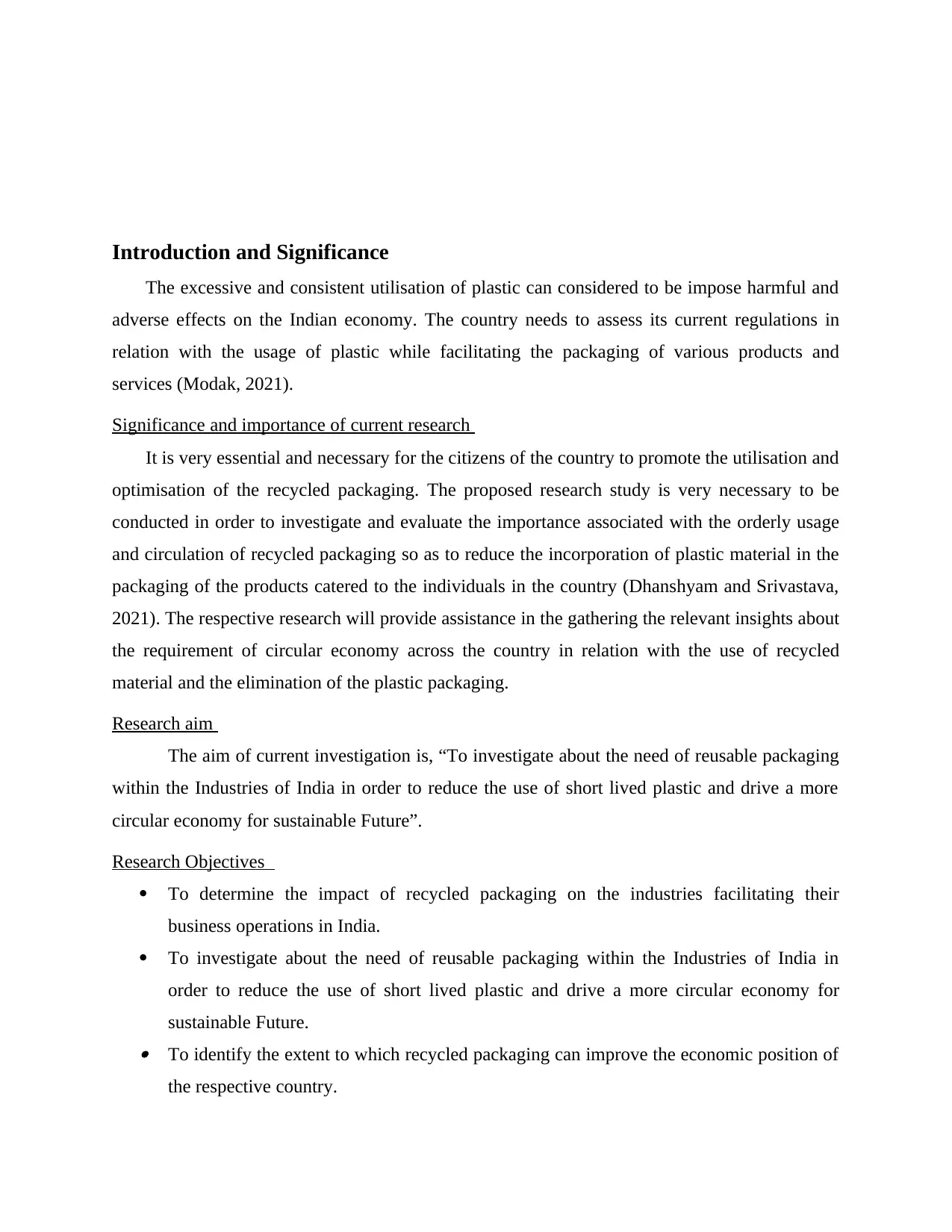
Introduction and Significance
The excessive and consistent utilisation of plastic can considered to be impose harmful and
adverse effects on the Indian economy. The country needs to assess its current regulations in
relation with the usage of plastic while facilitating the packaging of various products and
services (Modak, 2021).
Significance and importance of current research
It is very essential and necessary for the citizens of the country to promote the utilisation and
optimisation of the recycled packaging. The proposed research study is very necessary to be
conducted in order to investigate and evaluate the importance associated with the orderly usage
and circulation of recycled packaging so as to reduce the incorporation of plastic material in the
packaging of the products catered to the individuals in the country (Dhanshyam and Srivastava,
2021). The respective research will provide assistance in the gathering the relevant insights about
the requirement of circular economy across the country in relation with the use of recycled
material and the elimination of the plastic packaging.
Research aim
The aim of current investigation is, “To investigate about the need of reusable packaging
within the Industries of India in order to reduce the use of short lived plastic and drive a more
circular economy for sustainable Future”.
Research Objectives
To determine the impact of recycled packaging on the industries facilitating their
business operations in India.
To investigate about the need of reusable packaging within the Industries of India in
order to reduce the use of short lived plastic and drive a more circular economy for
sustainable Future. To identify the extent to which recycled packaging can improve the economic position of
the respective country.
The excessive and consistent utilisation of plastic can considered to be impose harmful and
adverse effects on the Indian economy. The country needs to assess its current regulations in
relation with the usage of plastic while facilitating the packaging of various products and
services (Modak, 2021).
Significance and importance of current research
It is very essential and necessary for the citizens of the country to promote the utilisation and
optimisation of the recycled packaging. The proposed research study is very necessary to be
conducted in order to investigate and evaluate the importance associated with the orderly usage
and circulation of recycled packaging so as to reduce the incorporation of plastic material in the
packaging of the products catered to the individuals in the country (Dhanshyam and Srivastava,
2021). The respective research will provide assistance in the gathering the relevant insights about
the requirement of circular economy across the country in relation with the use of recycled
material and the elimination of the plastic packaging.
Research aim
The aim of current investigation is, “To investigate about the need of reusable packaging
within the Industries of India in order to reduce the use of short lived plastic and drive a more
circular economy for sustainable Future”.
Research Objectives
To determine the impact of recycled packaging on the industries facilitating their
business operations in India.
To investigate about the need of reusable packaging within the Industries of India in
order to reduce the use of short lived plastic and drive a more circular economy for
sustainable Future. To identify the extent to which recycled packaging can improve the economic position of
the respective country.
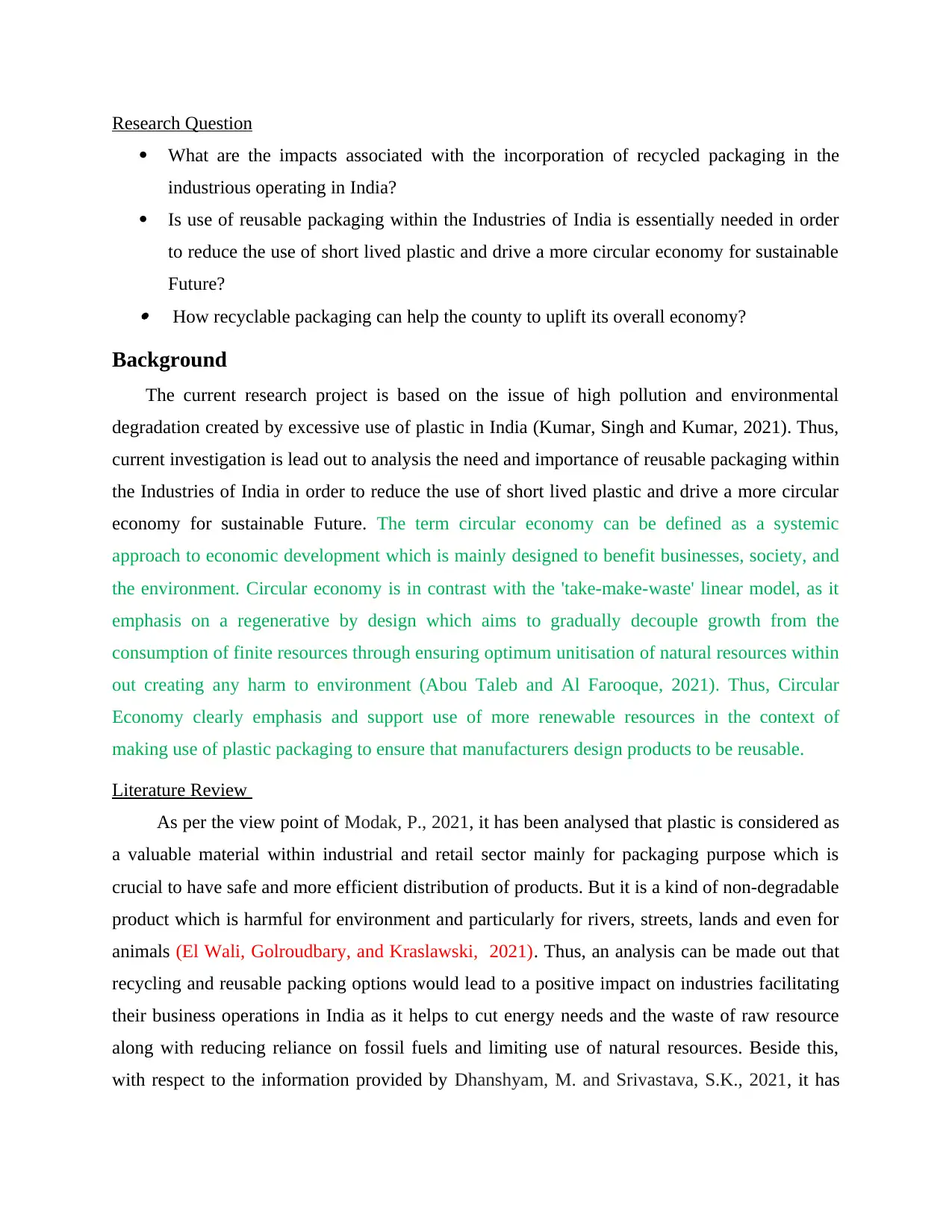
Research Question
What are the impacts associated with the incorporation of recycled packaging in the
industrious operating in India?
Is use of reusable packaging within the Industries of India is essentially needed in order
to reduce the use of short lived plastic and drive a more circular economy for sustainable
Future? How recyclable packaging can help the county to uplift its overall economy?
Background
The current research project is based on the issue of high pollution and environmental
degradation created by excessive use of plastic in India (Kumar, Singh and Kumar, 2021). Thus,
current investigation is lead out to analysis the need and importance of reusable packaging within
the Industries of India in order to reduce the use of short lived plastic and drive a more circular
economy for sustainable Future. The term circular economy can be defined as a systemic
approach to economic development which is mainly designed to benefit businesses, society, and
the environment. Circular economy is in contrast with the 'take-make-waste' linear model, as it
emphasis on a regenerative by design which aims to gradually decouple growth from the
consumption of finite resources through ensuring optimum unitisation of natural resources within
out creating any harm to environment (Abou Taleb and Al Farooque, 2021). Thus, Circular
Economy clearly emphasis and support use of more renewable resources in the context of
making use of plastic packaging to ensure that manufacturers design products to be reusable.
Literature Review
As per the view point of Modak, P., 2021, it has been analysed that plastic is considered as
a valuable material within industrial and retail sector mainly for packaging purpose which is
crucial to have safe and more efficient distribution of products. But it is a kind of non-degradable
product which is harmful for environment and particularly for rivers, streets, lands and even for
animals (El Wali, Golroudbary, and Kraslawski, 2021). Thus, an analysis can be made out that
recycling and reusable packing options would lead to a positive impact on industries facilitating
their business operations in India as it helps to cut energy needs and the waste of raw resource
along with reducing reliance on fossil fuels and limiting use of natural resources. Beside this,
with respect to the information provided by Dhanshyam, M. and Srivastava, S.K., 2021, it has
What are the impacts associated with the incorporation of recycled packaging in the
industrious operating in India?
Is use of reusable packaging within the Industries of India is essentially needed in order
to reduce the use of short lived plastic and drive a more circular economy for sustainable
Future? How recyclable packaging can help the county to uplift its overall economy?
Background
The current research project is based on the issue of high pollution and environmental
degradation created by excessive use of plastic in India (Kumar, Singh and Kumar, 2021). Thus,
current investigation is lead out to analysis the need and importance of reusable packaging within
the Industries of India in order to reduce the use of short lived plastic and drive a more circular
economy for sustainable Future. The term circular economy can be defined as a systemic
approach to economic development which is mainly designed to benefit businesses, society, and
the environment. Circular economy is in contrast with the 'take-make-waste' linear model, as it
emphasis on a regenerative by design which aims to gradually decouple growth from the
consumption of finite resources through ensuring optimum unitisation of natural resources within
out creating any harm to environment (Abou Taleb and Al Farooque, 2021). Thus, Circular
Economy clearly emphasis and support use of more renewable resources in the context of
making use of plastic packaging to ensure that manufacturers design products to be reusable.
Literature Review
As per the view point of Modak, P., 2021, it has been analysed that plastic is considered as
a valuable material within industrial and retail sector mainly for packaging purpose which is
crucial to have safe and more efficient distribution of products. But it is a kind of non-degradable
product which is harmful for environment and particularly for rivers, streets, lands and even for
animals (El Wali, Golroudbary, and Kraslawski, 2021). Thus, an analysis can be made out that
recycling and reusable packing options would lead to a positive impact on industries facilitating
their business operations in India as it helps to cut energy needs and the waste of raw resource
along with reducing reliance on fossil fuels and limiting use of natural resources. Beside this,
with respect to the information provided by Dhanshyam, M. and Srivastava, S.K., 2021, it has
⊘ This is a preview!⊘
Do you want full access?
Subscribe today to unlock all pages.

Trusted by 1+ million students worldwide
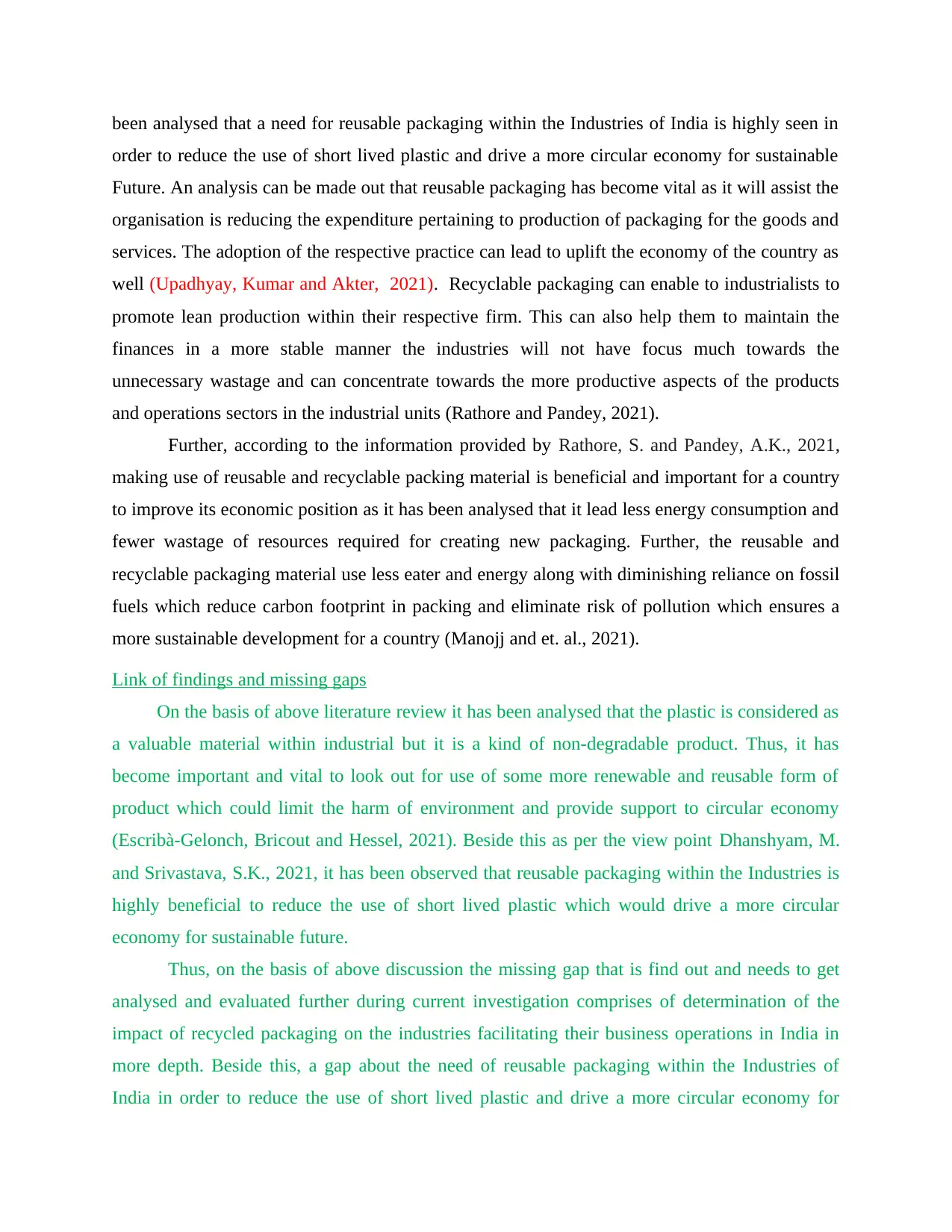
been analysed that a need for reusable packaging within the Industries of India is highly seen in
order to reduce the use of short lived plastic and drive a more circular economy for sustainable
Future. An analysis can be made out that reusable packaging has become vital as it will assist the
organisation is reducing the expenditure pertaining to production of packaging for the goods and
services. The adoption of the respective practice can lead to uplift the economy of the country as
well (Upadhyay, Kumar and Akter, 2021). Recyclable packaging can enable to industrialists to
promote lean production within their respective firm. This can also help them to maintain the
finances in a more stable manner the industries will not have focus much towards the
unnecessary wastage and can concentrate towards the more productive aspects of the products
and operations sectors in the industrial units (Rathore and Pandey, 2021).
Further, according to the information provided by Rathore, S. and Pandey, A.K., 2021,
making use of reusable and recyclable packing material is beneficial and important for a country
to improve its economic position as it has been analysed that it lead less energy consumption and
fewer wastage of resources required for creating new packaging. Further, the reusable and
recyclable packaging material use less eater and energy along with diminishing reliance on fossil
fuels which reduce carbon footprint in packing and eliminate risk of pollution which ensures a
more sustainable development for a country (Manojj and et. al., 2021).
Link of findings and missing gaps
On the basis of above literature review it has been analysed that the plastic is considered as
a valuable material within industrial but it is a kind of non-degradable product. Thus, it has
become important and vital to look out for use of some more renewable and reusable form of
product which could limit the harm of environment and provide support to circular economy
(Escribà-Gelonch, Bricout and Hessel, 2021). Beside this as per the view point Dhanshyam, M.
and Srivastava, S.K., 2021, it has been observed that reusable packaging within the Industries is
highly beneficial to reduce the use of short lived plastic which would drive a more circular
economy for sustainable future.
Thus, on the basis of above discussion the missing gap that is find out and needs to get
analysed and evaluated further during current investigation comprises of determination of the
impact of recycled packaging on the industries facilitating their business operations in India in
more depth. Beside this, a gap about the need of reusable packaging within the Industries of
India in order to reduce the use of short lived plastic and drive a more circular economy for
order to reduce the use of short lived plastic and drive a more circular economy for sustainable
Future. An analysis can be made out that reusable packaging has become vital as it will assist the
organisation is reducing the expenditure pertaining to production of packaging for the goods and
services. The adoption of the respective practice can lead to uplift the economy of the country as
well (Upadhyay, Kumar and Akter, 2021). Recyclable packaging can enable to industrialists to
promote lean production within their respective firm. This can also help them to maintain the
finances in a more stable manner the industries will not have focus much towards the
unnecessary wastage and can concentrate towards the more productive aspects of the products
and operations sectors in the industrial units (Rathore and Pandey, 2021).
Further, according to the information provided by Rathore, S. and Pandey, A.K., 2021,
making use of reusable and recyclable packing material is beneficial and important for a country
to improve its economic position as it has been analysed that it lead less energy consumption and
fewer wastage of resources required for creating new packaging. Further, the reusable and
recyclable packaging material use less eater and energy along with diminishing reliance on fossil
fuels which reduce carbon footprint in packing and eliminate risk of pollution which ensures a
more sustainable development for a country (Manojj and et. al., 2021).
Link of findings and missing gaps
On the basis of above literature review it has been analysed that the plastic is considered as
a valuable material within industrial but it is a kind of non-degradable product. Thus, it has
become important and vital to look out for use of some more renewable and reusable form of
product which could limit the harm of environment and provide support to circular economy
(Escribà-Gelonch, Bricout and Hessel, 2021). Beside this as per the view point Dhanshyam, M.
and Srivastava, S.K., 2021, it has been observed that reusable packaging within the Industries is
highly beneficial to reduce the use of short lived plastic which would drive a more circular
economy for sustainable future.
Thus, on the basis of above discussion the missing gap that is find out and needs to get
analysed and evaluated further during current investigation comprises of determination of the
impact of recycled packaging on the industries facilitating their business operations in India in
more depth. Beside this, a gap about the need of reusable packaging within the Industries of
India in order to reduce the use of short lived plastic and drive a more circular economy for
Paraphrase This Document
Need a fresh take? Get an instant paraphrase of this document with our AI Paraphraser
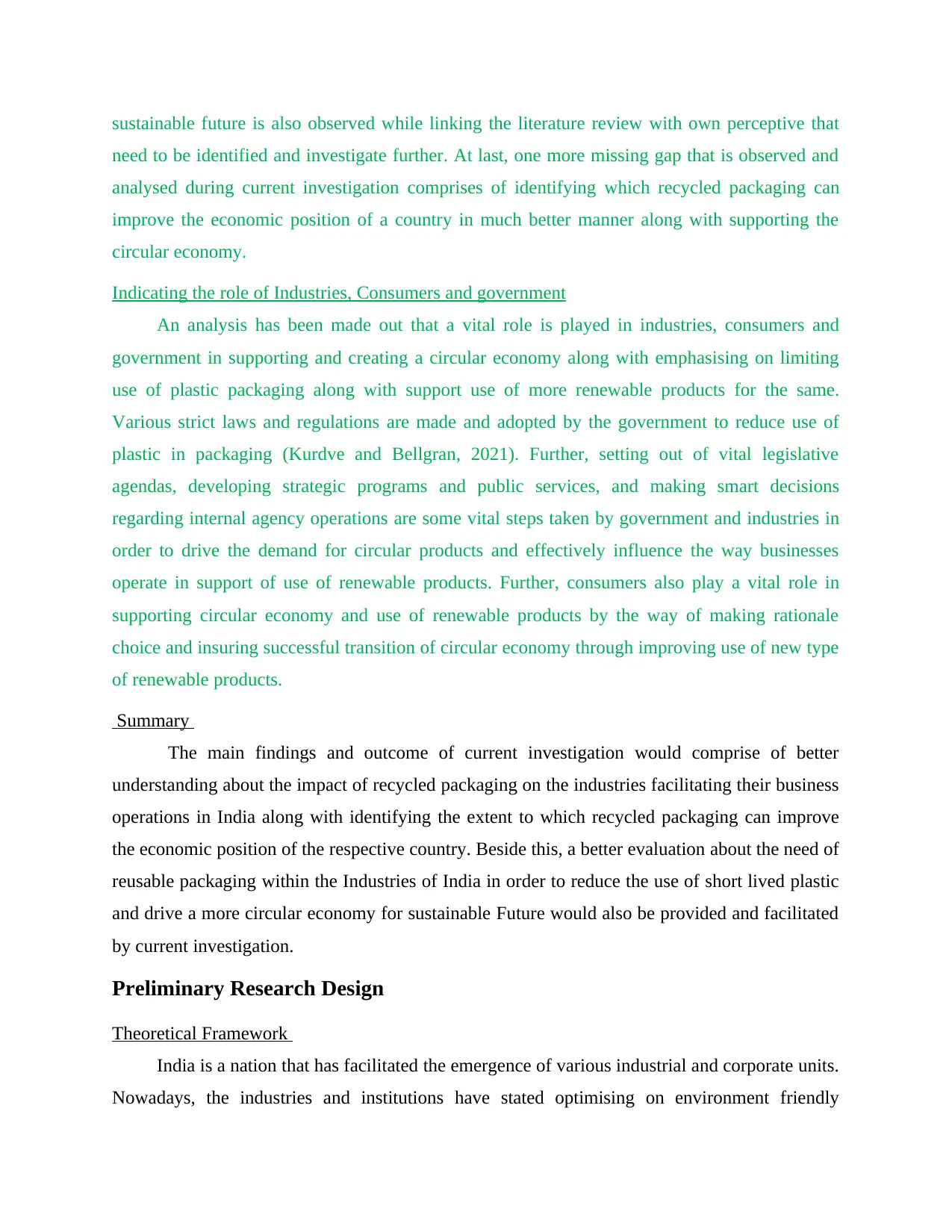
sustainable future is also observed while linking the literature review with own perceptive that
need to be identified and investigate further. At last, one more missing gap that is observed and
analysed during current investigation comprises of identifying which recycled packaging can
improve the economic position of a country in much better manner along with supporting the
circular economy.
Indicating the role of Industries, Consumers and government
An analysis has been made out that a vital role is played in industries, consumers and
government in supporting and creating a circular economy along with emphasising on limiting
use of plastic packaging along with support use of more renewable products for the same.
Various strict laws and regulations are made and adopted by the government to reduce use of
plastic in packaging (Kurdve and Bellgran, 2021). Further, setting out of vital legislative
agendas, developing strategic programs and public services, and making smart decisions
regarding internal agency operations are some vital steps taken by government and industries in
order to drive the demand for circular products and effectively influence the way businesses
operate in support of use of renewable products. Further, consumers also play a vital role in
supporting circular economy and use of renewable products by the way of making rationale
choice and insuring successful transition of circular economy through improving use of new type
of renewable products.
Summary
The main findings and outcome of current investigation would comprise of better
understanding about the impact of recycled packaging on the industries facilitating their business
operations in India along with identifying the extent to which recycled packaging can improve
the economic position of the respective country. Beside this, a better evaluation about the need of
reusable packaging within the Industries of India in order to reduce the use of short lived plastic
and drive a more circular economy for sustainable Future would also be provided and facilitated
by current investigation.
Preliminary Research Design
Theoretical Framework
India is a nation that has facilitated the emergence of various industrial and corporate units.
Nowadays, the industries and institutions have stated optimising on environment friendly
need to be identified and investigate further. At last, one more missing gap that is observed and
analysed during current investigation comprises of identifying which recycled packaging can
improve the economic position of a country in much better manner along with supporting the
circular economy.
Indicating the role of Industries, Consumers and government
An analysis has been made out that a vital role is played in industries, consumers and
government in supporting and creating a circular economy along with emphasising on limiting
use of plastic packaging along with support use of more renewable products for the same.
Various strict laws and regulations are made and adopted by the government to reduce use of
plastic in packaging (Kurdve and Bellgran, 2021). Further, setting out of vital legislative
agendas, developing strategic programs and public services, and making smart decisions
regarding internal agency operations are some vital steps taken by government and industries in
order to drive the demand for circular products and effectively influence the way businesses
operate in support of use of renewable products. Further, consumers also play a vital role in
supporting circular economy and use of renewable products by the way of making rationale
choice and insuring successful transition of circular economy through improving use of new type
of renewable products.
Summary
The main findings and outcome of current investigation would comprise of better
understanding about the impact of recycled packaging on the industries facilitating their business
operations in India along with identifying the extent to which recycled packaging can improve
the economic position of the respective country. Beside this, a better evaluation about the need of
reusable packaging within the Industries of India in order to reduce the use of short lived plastic
and drive a more circular economy for sustainable Future would also be provided and facilitated
by current investigation.
Preliminary Research Design
Theoretical Framework
India is a nation that has facilitated the emergence of various industrial and corporate units.
Nowadays, the industries and institutions have stated optimising on environment friendly
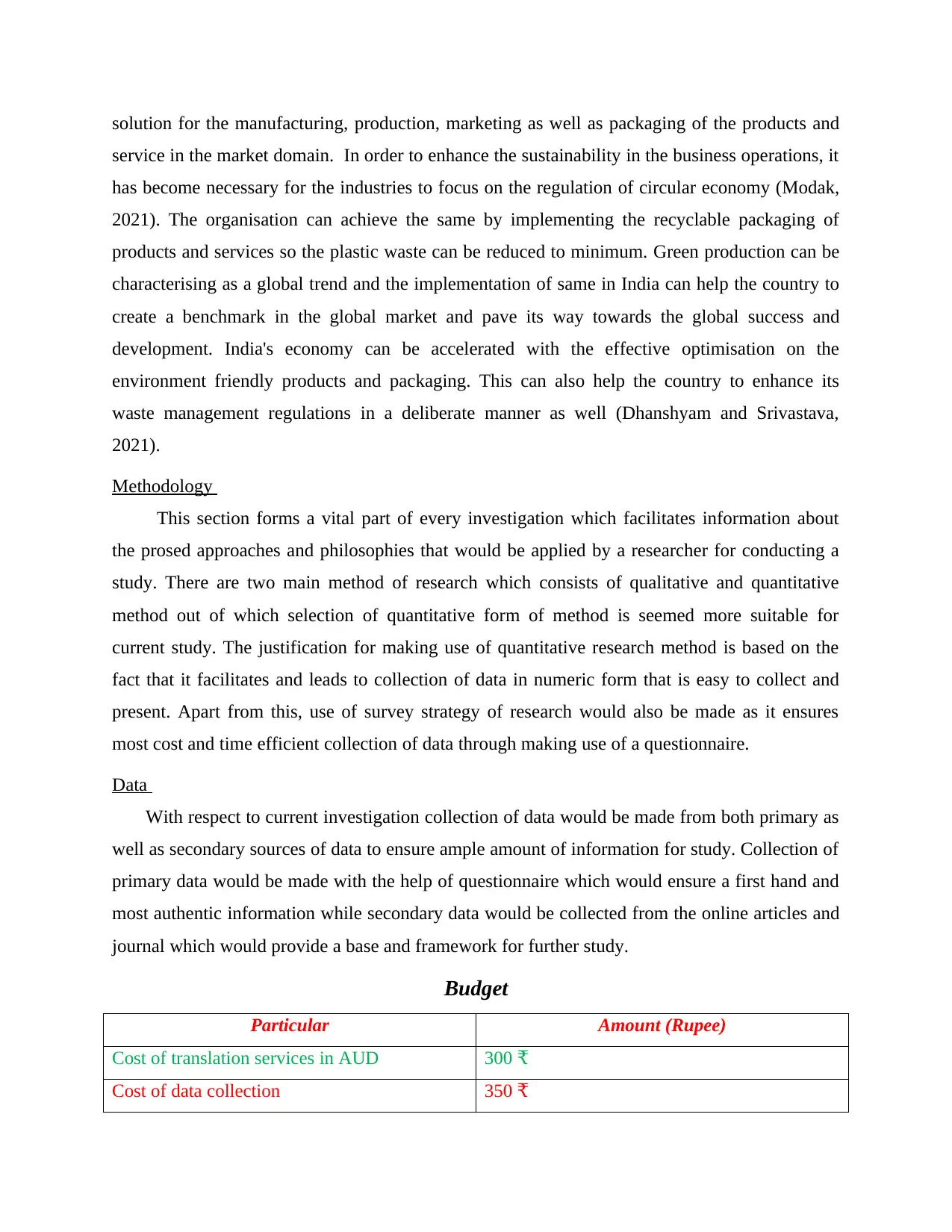
solution for the manufacturing, production, marketing as well as packaging of the products and
service in the market domain. In order to enhance the sustainability in the business operations, it
has become necessary for the industries to focus on the regulation of circular economy (Modak,
2021). The organisation can achieve the same by implementing the recyclable packaging of
products and services so the plastic waste can be reduced to minimum. Green production can be
characterising as a global trend and the implementation of same in India can help the country to
create a benchmark in the global market and pave its way towards the global success and
development. India's economy can be accelerated with the effective optimisation on the
environment friendly products and packaging. This can also help the country to enhance its
waste management regulations in a deliberate manner as well (Dhanshyam and Srivastava,
2021).
Methodology
This section forms a vital part of every investigation which facilitates information about
the prosed approaches and philosophies that would be applied by a researcher for conducting a
study. There are two main method of research which consists of qualitative and quantitative
method out of which selection of quantitative form of method is seemed more suitable for
current study. The justification for making use of quantitative research method is based on the
fact that it facilitates and leads to collection of data in numeric form that is easy to collect and
present. Apart from this, use of survey strategy of research would also be made as it ensures
most cost and time efficient collection of data through making use of a questionnaire.
Data
With respect to current investigation collection of data would be made from both primary as
well as secondary sources of data to ensure ample amount of information for study. Collection of
primary data would be made with the help of questionnaire which would ensure a first hand and
most authentic information while secondary data would be collected from the online articles and
journal which would provide a base and framework for further study.
Budget
Particular Amount (Rupee)
Cost of translation services in AUD 300 ₹
Cost of data collection 350 ₹
service in the market domain. In order to enhance the sustainability in the business operations, it
has become necessary for the industries to focus on the regulation of circular economy (Modak,
2021). The organisation can achieve the same by implementing the recyclable packaging of
products and services so the plastic waste can be reduced to minimum. Green production can be
characterising as a global trend and the implementation of same in India can help the country to
create a benchmark in the global market and pave its way towards the global success and
development. India's economy can be accelerated with the effective optimisation on the
environment friendly products and packaging. This can also help the country to enhance its
waste management regulations in a deliberate manner as well (Dhanshyam and Srivastava,
2021).
Methodology
This section forms a vital part of every investigation which facilitates information about
the prosed approaches and philosophies that would be applied by a researcher for conducting a
study. There are two main method of research which consists of qualitative and quantitative
method out of which selection of quantitative form of method is seemed more suitable for
current study. The justification for making use of quantitative research method is based on the
fact that it facilitates and leads to collection of data in numeric form that is easy to collect and
present. Apart from this, use of survey strategy of research would also be made as it ensures
most cost and time efficient collection of data through making use of a questionnaire.
Data
With respect to current investigation collection of data would be made from both primary as
well as secondary sources of data to ensure ample amount of information for study. Collection of
primary data would be made with the help of questionnaire which would ensure a first hand and
most authentic information while secondary data would be collected from the online articles and
journal which would provide a base and framework for further study.
Budget
Particular Amount (Rupee)
Cost of translation services in AUD 300 ₹
Cost of data collection 350 ₹
⊘ This is a preview!⊘
Do you want full access?
Subscribe today to unlock all pages.

Trusted by 1+ million students worldwide
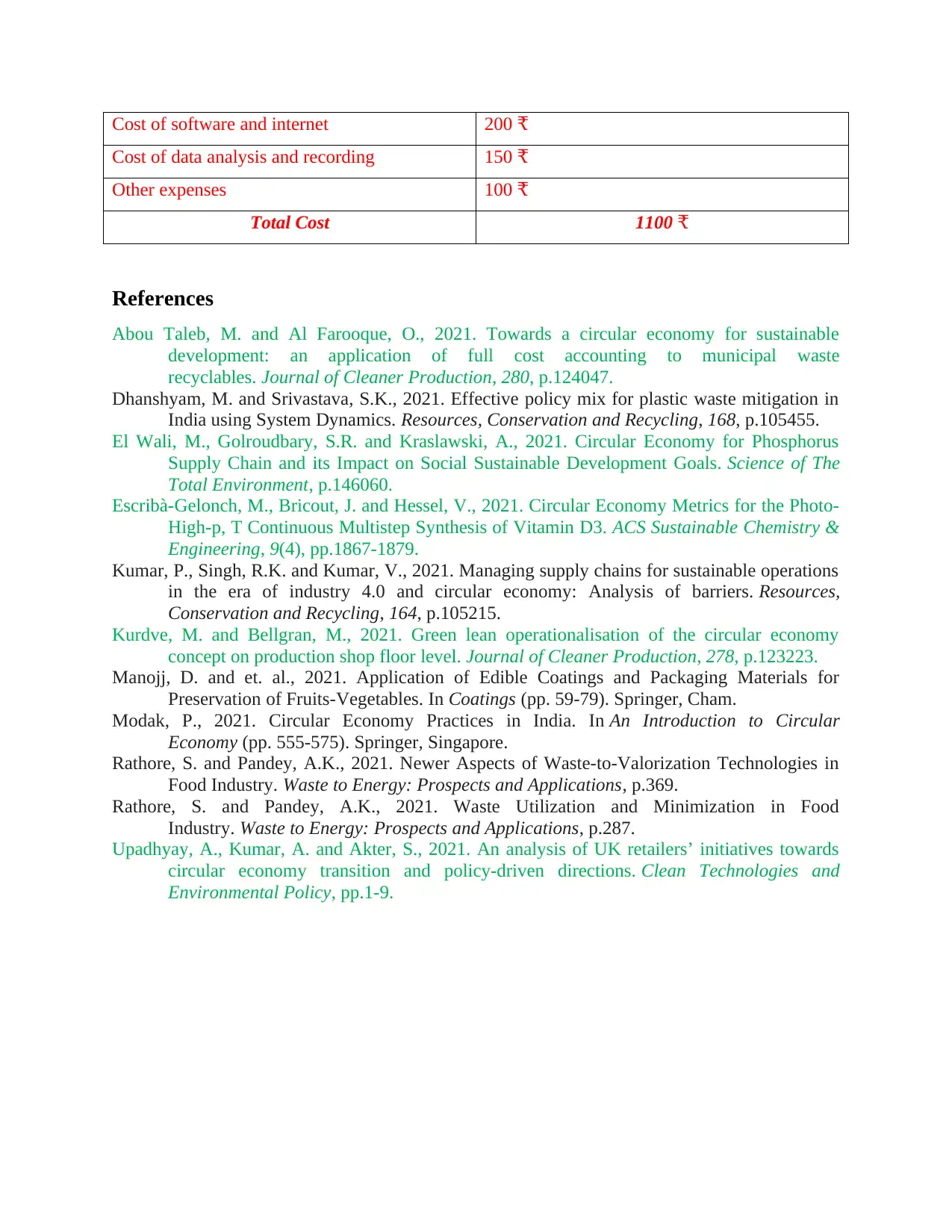
Cost of software and internet 200 ₹
Cost of data analysis and recording 150 ₹
Other expenses 100 ₹
Total Cost 1100 ₹
References
Abou Taleb, M. and Al Farooque, O., 2021. Towards a circular economy for sustainable
development: an application of full cost accounting to municipal waste
recyclables. Journal of Cleaner Production, 280, p.124047.
Dhanshyam, M. and Srivastava, S.K., 2021. Effective policy mix for plastic waste mitigation in
India using System Dynamics. Resources, Conservation and Recycling, 168, p.105455.
El Wali, M., Golroudbary, S.R. and Kraslawski, A., 2021. Circular Economy for Phosphorus
Supply Chain and its Impact on Social Sustainable Development Goals. Science of The
Total Environment, p.146060.
Escribà-Gelonch, M., Bricout, J. and Hessel, V., 2021. Circular Economy Metrics for the Photo-
High-p, T Continuous Multistep Synthesis of Vitamin D3. ACS Sustainable Chemistry &
Engineering, 9(4), pp.1867-1879.
Kumar, P., Singh, R.K. and Kumar, V., 2021. Managing supply chains for sustainable operations
in the era of industry 4.0 and circular economy: Analysis of barriers. Resources,
Conservation and Recycling, 164, p.105215.
Kurdve, M. and Bellgran, M., 2021. Green lean operationalisation of the circular economy
concept on production shop floor level. Journal of Cleaner Production, 278, p.123223.
Manojj, D. and et. al., 2021. Application of Edible Coatings and Packaging Materials for
Preservation of Fruits-Vegetables. In Coatings (pp. 59-79). Springer, Cham.
Modak, P., 2021. Circular Economy Practices in India. In An Introduction to Circular
Economy (pp. 555-575). Springer, Singapore.
Rathore, S. and Pandey, A.K., 2021. Newer Aspects of Waste-to-Valorization Technologies in
Food Industry. Waste to Energy: Prospects and Applications, p.369.
Rathore, S. and Pandey, A.K., 2021. Waste Utilization and Minimization in Food
Industry. Waste to Energy: Prospects and Applications, p.287.
Upadhyay, A., Kumar, A. and Akter, S., 2021. An analysis of UK retailers’ initiatives towards
circular economy transition and policy-driven directions. Clean Technologies and
Environmental Policy, pp.1-9.
Cost of data analysis and recording 150 ₹
Other expenses 100 ₹
Total Cost 1100 ₹
References
Abou Taleb, M. and Al Farooque, O., 2021. Towards a circular economy for sustainable
development: an application of full cost accounting to municipal waste
recyclables. Journal of Cleaner Production, 280, p.124047.
Dhanshyam, M. and Srivastava, S.K., 2021. Effective policy mix for plastic waste mitigation in
India using System Dynamics. Resources, Conservation and Recycling, 168, p.105455.
El Wali, M., Golroudbary, S.R. and Kraslawski, A., 2021. Circular Economy for Phosphorus
Supply Chain and its Impact on Social Sustainable Development Goals. Science of The
Total Environment, p.146060.
Escribà-Gelonch, M., Bricout, J. and Hessel, V., 2021. Circular Economy Metrics for the Photo-
High-p, T Continuous Multistep Synthesis of Vitamin D3. ACS Sustainable Chemistry &
Engineering, 9(4), pp.1867-1879.
Kumar, P., Singh, R.K. and Kumar, V., 2021. Managing supply chains for sustainable operations
in the era of industry 4.0 and circular economy: Analysis of barriers. Resources,
Conservation and Recycling, 164, p.105215.
Kurdve, M. and Bellgran, M., 2021. Green lean operationalisation of the circular economy
concept on production shop floor level. Journal of Cleaner Production, 278, p.123223.
Manojj, D. and et. al., 2021. Application of Edible Coatings and Packaging Materials for
Preservation of Fruits-Vegetables. In Coatings (pp. 59-79). Springer, Cham.
Modak, P., 2021. Circular Economy Practices in India. In An Introduction to Circular
Economy (pp. 555-575). Springer, Singapore.
Rathore, S. and Pandey, A.K., 2021. Newer Aspects of Waste-to-Valorization Technologies in
Food Industry. Waste to Energy: Prospects and Applications, p.369.
Rathore, S. and Pandey, A.K., 2021. Waste Utilization and Minimization in Food
Industry. Waste to Energy: Prospects and Applications, p.287.
Upadhyay, A., Kumar, A. and Akter, S., 2021. An analysis of UK retailers’ initiatives towards
circular economy transition and policy-driven directions. Clean Technologies and
Environmental Policy, pp.1-9.
1 out of 7
Related Documents
Your All-in-One AI-Powered Toolkit for Academic Success.
+13062052269
info@desklib.com
Available 24*7 on WhatsApp / Email
![[object Object]](/_next/static/media/star-bottom.7253800d.svg)
Unlock your academic potential
Copyright © 2020–2026 A2Z Services. All Rights Reserved. Developed and managed by ZUCOL.





